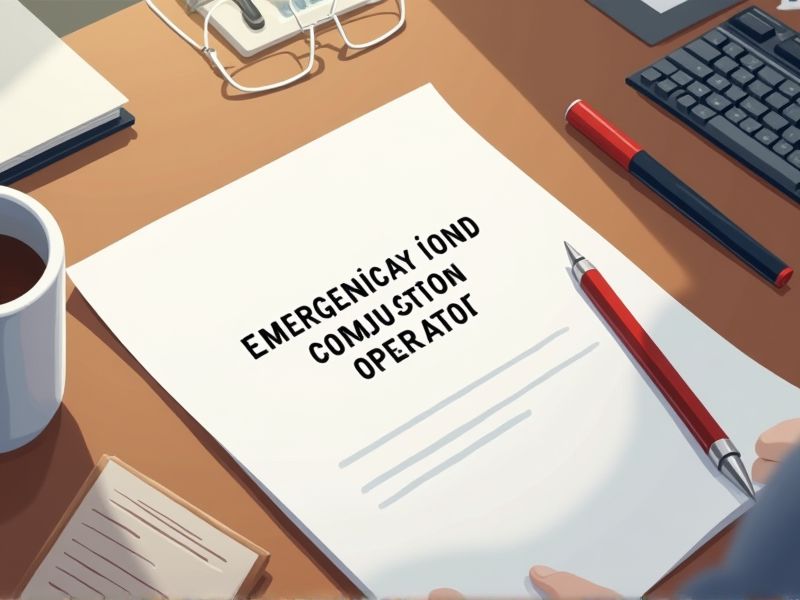
Emergency Communications Operators serve as the critical link between the public and emergency services, necessitating a high level of proficiency and reliability. The ever-evolving nature of emergencies requires operators to possess specialized skills and knowledge, ensuring they can respond effectively to diverse situations. Certifications establish standardized competencies, enhancing the operator's ability to manage calls and dispatch services proficiently. The following certifications are essential for those pursuing a career as an Emergency Communications Operator.
Emergency Medical Dispatch (EMD) Certification
Emergency Medical Dispatch (EMD) Certification equips operators with critical knowledge to assess emergency situations effectively. This certification enhances the operator's ability to provide accurate pre-arrival instructions to callers, which can stabilize patients until help arrives. Training from the EMD program improves response times by ensuring that the right resources are dispatched quickly and appropriately. The certification ensures consistent handling of calls, minimizing errors and increasing the overall efficiency of emergency systems.
Public Safety Telecommunicator Certification
Public Safety Telecommunicator Certification is necessary because it ensures operators have the knowledge and skills to effectively manage emergency communications. This certification provides standardized training that helps reduce errors in crisis situations. Certified operators are better equipped to understand and use the technology and protocols required in handling emergency calls. The certification process also instills a sense of accountability and professionalism, crucial for maintaining public trust and safety.
Medical Priority Dispatch System (MPDS) Certification
Medical Priority Dispatch System (MPDS) Certification for Emergency Communications Operators ensures standardized protocols, enhancing decision-making in crisis situations. Certification provides operators with essential skills for accurate information gathering and dispatching appropriate resources swiftly. Empirical data indicates that MPDS-trained operators reduce response times, boosting the chances of positive patient outcomes. Consistent training and certification also minimize errors and maintain efficiency in emergency services.
911 Operator Certification
911 Operator Certification ensures standardized training, which enhances the ability to efficiently handle emergency situations. It validates the operator's competence in using critical communication equipment and systems. Certification improves public trust as operators are recognized as qualified professionals. It also reduces liability for dispatch centers by ensuring operators meet specific skill requirements.
Basic Life Support (BLS) Certification
Emergency Communications Operators often deal with high-pressure situations where timely guidance is crucial for public safety. BLS Certification equips them with the knowledge to instruct callers on performing life-saving techniques like CPR while waiting for emergency responders. With this training, operators enhance overall community safety by providing accurate and efficient advice during critical moments. Possession of BLS Certification also solidifies the operator's credibility, ensuring that they are well-prepared to handle emergencies effectively.
CPR and AED Certification
Emergency Communications Operators must often guide callers through life-saving procedures; CPR and AED certification equips them with the necessary knowledge and confidence to do so effectively. This training ensures they can provide accurate instructions during cardiac emergencies, significantly improving patient survival rates. CPR-certified operators can serve as vital liaisons between callers and first responders. Their ability to communicate precise, evidence-based guidance facilitates timely intervention, enhancing emergency response outcomes.
Incident Command System (ICS) Certification
Emergency Communications Operators need ICS Certification due to the structured, standardized approach ICS provides for managing emergency situations. This certification enables operators to effectively coordinate communication between various agencies, reducing potential miscommunication in crisis situations. ICS knowledge equips operators with the ability to operate within a unified command structure, enhancing response efficiency. Emergency response outcomes improve with ICS-certified operators due to streamlined processes and clear roles.
National Emergency Number Association (NENA) Certification
The NENA Certification equips an Emergency Communications Operator with standardized knowledge and skills required for efficient handling of emergency situations, improving response times. Enhanced competency through NENA qualifies operators for better decision-making in high-pressure environments, directly influencing public safety outcomes. Certification aligns operators with national standards, ensuring consistent service quality across different jurisdictions. Employers favor NENA-certified individuals, recognizing their proven ability to effectively manage critical emergency communications.
Computer Aided Dispatch (CAD) Training Certification
CAD Training Certification equips Emergency Communications Operators with the essential skills to efficiently use computer-aided dispatch systems, which directly enhances their ability to coordinate timely emergency responses. Mastery of CAD systems through certified training results in reduced response times and increased accuracy in incident reporting, crucial for saving lives. Certification ensures that operators meet standardized operational and technical competencies necessary for handling complex emergency communications. The structured learning process of the certification allows operators to stay updated with technological advancements, which enhances overall emergency management efficiency.
Crisis Intervention Certification
Crisis intervention certification equips emergency communications operators with the skills to manage and defuse high-stress situations effectively, ensuring that responders receive accurate and timely information. This certification enhances operators' ability to recognize signs of distress and mental health issues, leading to better support for callers in crisis. With specialized training, operators can improve communication, ultimately reducing misunderstandings and response times. The certification can contribute to operator job satisfaction and resilience, lowering turnover rates and maintaining a skilled workforce.
Summary
By obtaining certifications, you enhance your competence and credibility in emergency communications. This leads to increased efficiency, ensuring faster and more accurate response coordination. Employers often recognize and value certified professionals, which can improve your career prospects and job stability. Your certification can contribute to better public trust and confidence in emergency services.
